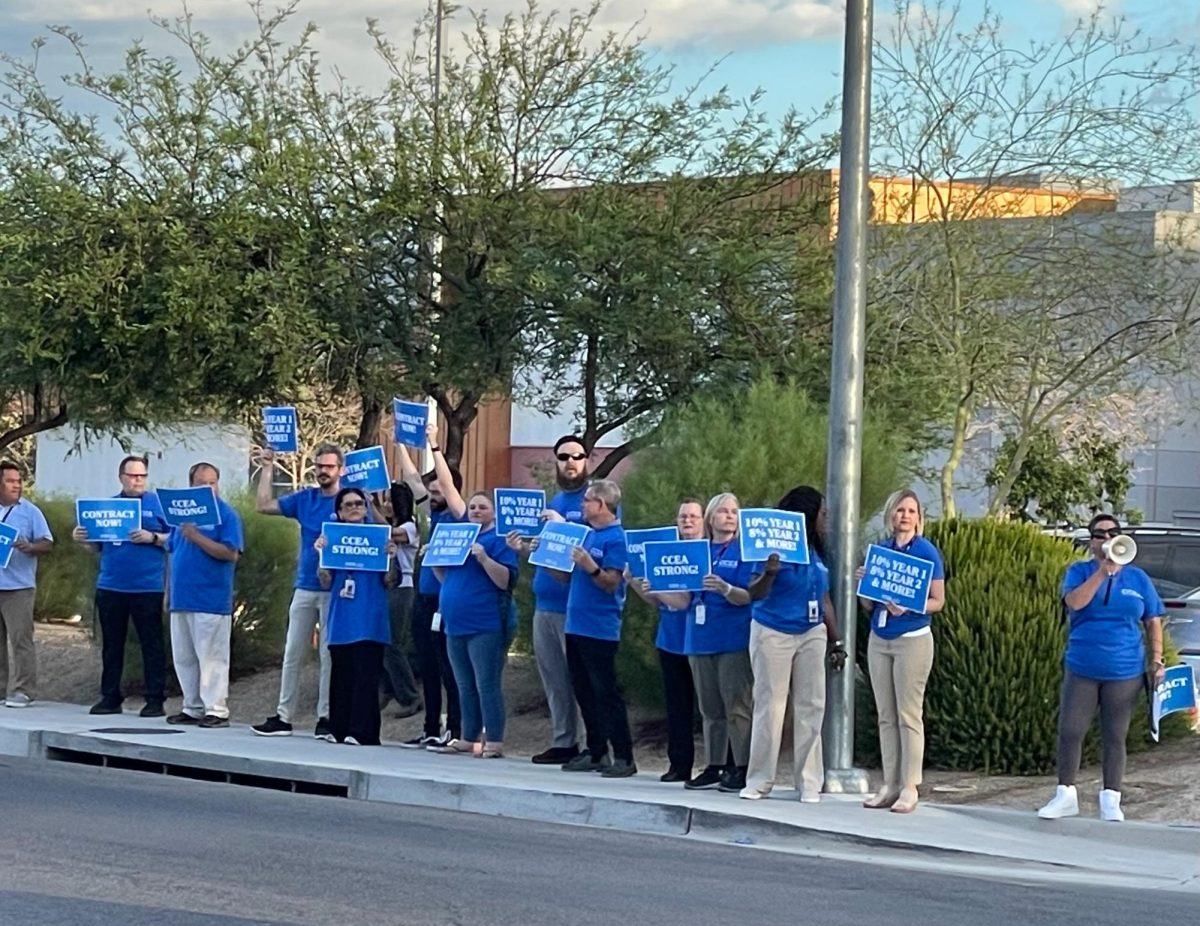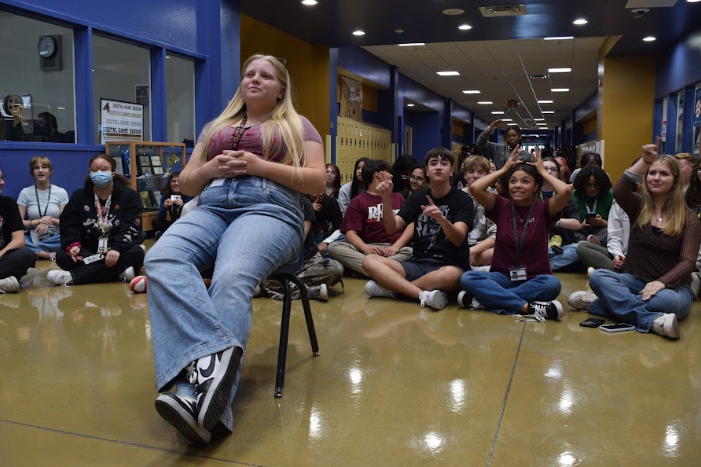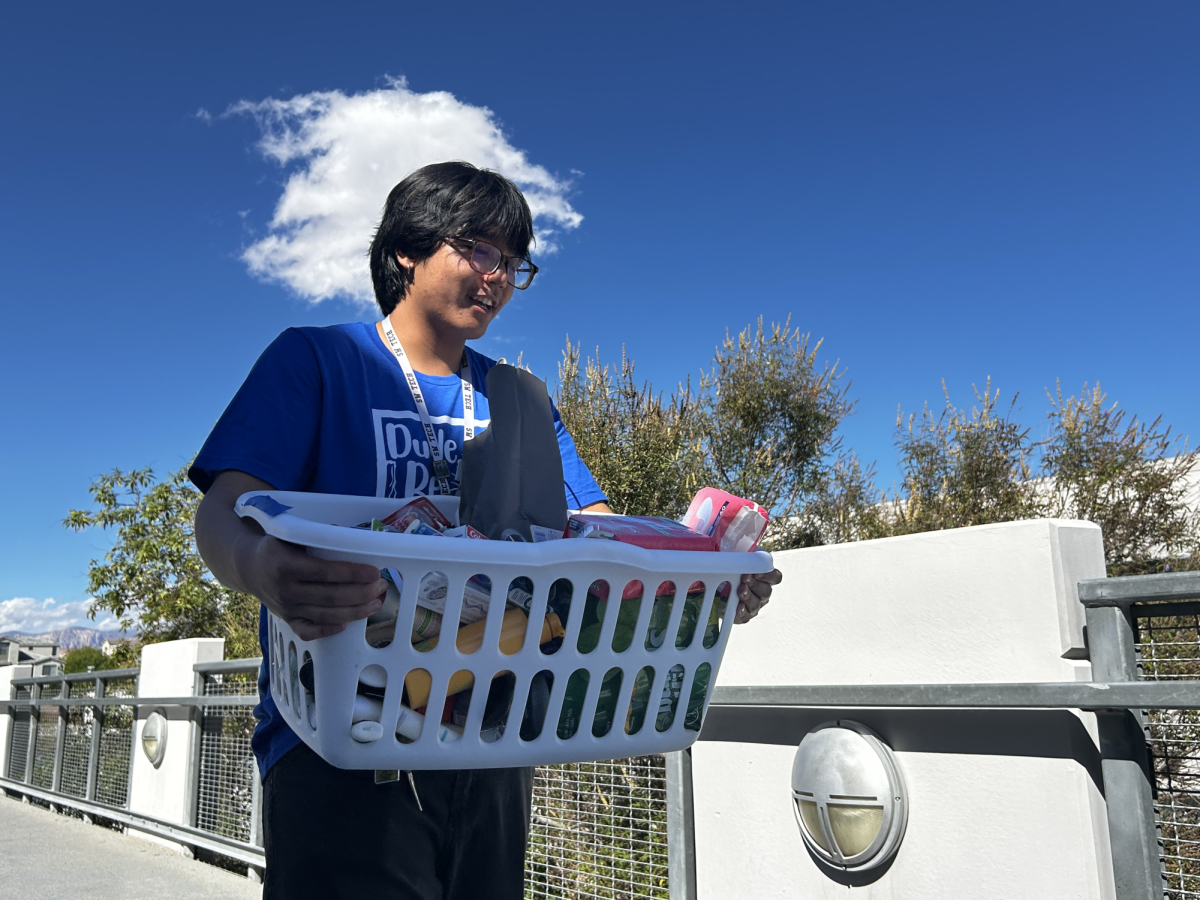After several meetings held in the past two weeks regarding contract negotiations and multiple protests, Clark County Education Association and CCSD have yet to reach a final agreement on a contract.
“I waited for somebody to do that [organize the protest] and nobody sent out an email,” Computer Science teacher Dana Cuni said. “It came to my attention that nobody was going to do it if I wasn’t, so I decided this is important enough where it needs to be done, and I got together with three or four teachers from other schools and we planned it together. I’ve been really fortunate to have other teachers doing most of the heavy lifting, writing the emails, and sending out the announcements.”
The union’s non-negotiables include a 10 percent increase in pay during the first year of the contract and an 8 percent increase during the second year for all educators. An increase in health care premiums to match that of the administration, and increased stipends for coaches and SPED educators are also among their demands.
“I personally decided to join because I have a lot of passion when it comes to expressing my views and supporting my fellow teachers,” Social Studies Department Chairperson Joseph Juliano said. “I see protest as a peaceful way to step out of the day-to-day motions and make the statement that we are willing to go out of our way to get what we think is fair.”
Part of what CCSD is offering in negotiations includes a “look back” proposal to correct salary placement after the schedule changed in 2016 to accurately reflect an educator’s experience and level of education.
“I’ve been in the district since 2007 and my pay has been frozen six times,” Cuni said. “We’ve even had a pay decrease once. So if those hadn’t been frozen and we kept going my salary would be extremely higher now. But, no one takes into consideration those things.”
The Nevada legislature allocated $250 million for teacher raises along with $2 billion for per pupil funding. CCSD is offering a salary increase of 8.5 percent in the first year and a 2 percent raise in the second year, which CCEA opposes because it does not keep up with the inflation rate. CCSD claims the 1.5 percent difference comes down to fairness and equity. Superintendent Dr. Jesus Jara argues that the CCEA’s requests for a raise “far exceed” the money that was provided for them by the Pupil Centered Funding Plan and would require them to use one-time funds for the ongoing compensation of teachers after two years.
“I would say that well-behaved people have never changed history,” Cuni said. “CCSD is over 1500 teachers short this year and there are not enough teacher candidates attending the surrounding secondary schools to remedy that. CCSD’s job is to find and keep teachers and with statements like this that gaslight teachers, they are not doing their job.”
Additional protests have been taking place, including on August 10, when a CCSD Board of Trustees meeting was adjourned due to protests occurring outside and inside of the meeting. The chant, “no contract, no peace,” was heard from members inside and outside of the meeting, ultimately interrupting their proceedings, resulting in a unanimous decision to suspend. In response to this occurrence, CCSD posted a statement on X.
“Everyone has the right to express themselves peacefully, but they do not have the right to block traffic, disrupt the business proceedings of a public body, or prevent public agency operations through ‘work actions’,” CCSD said in a press release. “Our educators deserve a raise and an equitable salary schedule, and we will continue advocating for both as long as negotiations continue. Getting our teachers their raises can only occur at the bargaining table, not by disrupting businesses, meetings, or traffic.”
Teacher salaries are a national concern. In 2017, researchers found that public school teachers earn 18.7 percent less than their non-teacher peers.
“I see firsthand how much work, effect, time, and energy goes into teaching,” teaching and training student Ellie Lakatos said. “It is not an easy job and it is often underestimated. We need good teachers, but to get and keep these good teachers, they need to be paid what they deserve. I also hope that teachers in the U.S. gain more respect. In other countries they are incredibly respected, but here that is often lacking.”




![Weighing her options, senior Allyana Abao decides between going on a practice drive or calling an Uber. Though unlicensed, Abao has considered driving to be a significant milestone of teen independence despite alternatives that provide much easier solutions.
“You're able to be independent and not rely on others,” Abao said. “You're able to get a job, get things that you need, go places you need to go. I have so many places that I want to go to and I ask [my family] for so much. I want to be independent to where they know that I can do things on my own, so they know that they don't have to be there for me.”](https://southwestshadow.com/wp-content/uploads/2025/10/IMG_2922-1200x900.jpg)
![Looking at the board, former BSU secretary Christina Altaye begins to prepare for BSU’s second year of Club Feud. This year, “Are You Smarter Than a Ninth Grader?” will be replacing this event. “I think it’s a fun change [to Club Feud],” BSU Activities Director Hellen Beyene said. “[I think] it’s always fun to do something new and different.”](https://southwestshadow.com/wp-content/uploads/2025/10/Screenshot-2025-09-29-11.06.43.png)


!["I will be attending Trunk or Treat [for FCCLA]" junior Crystal Li said. "We're gonna use Mr. Harbeson's car, and we will be [hosting three different activities]."](https://southwestshadow.com/wp-content/uploads/2025/10/IMG_0980-1200x900.png)


![Displaying a QR code for students to scan, the flyer allows students to sign up and learn about their desired colleges as they visit throughout the school year. Many schools have had additional presentations for students to learn more about what they offer. “For me, I’m interested in criminal justice,” junior Zion Jefferson said. “I know that UNLV and Nevada State University have this major. But, [the college fair] is going to be beneficial, so I can see what other schools offer as well.”](https://southwestshadow.com/wp-content/uploads/2025/10/IMG_2721-1200x900.jpg)
![Working in the Student Success Office, Attendance Secretary Lordis Depiazza inputs a student’s absence excuse note. Students are required to bring an excuse note to the attendance office within three days of any absence. “Reminding students that being in school is important because it reflects towards your grades and being able to do any activities with the school,” Depiazza said. “[It] seems to get the students' attention about wanting to be in school.”](https://southwestshadow.com/wp-content/uploads/2025/10/IMG_8313-1200x800.jpg)
![Arranging the fabric on the floor for a new project, senior Sapphyre-Ann Leung plans out her attire for the next deadline. With the recent closures, students now had limited resources and less margin for error with the fabric and materials they had in stock while trying to reach strict deadlines. “Joann’s had a lot of high-end fabric for our fashion competitions,” Leung said. “We couldn’t just buy ten yards of fabric from Hobby Lobby or Walmart. Since [Joann Fabrics] is no longer open, we have to buy items online, which is way more expensive.”](https://southwestshadow.com/wp-content/uploads/2025/10/IMG_0038-1200x800.jpg)
